人教版英语七年级上 Unit3- Unit4单元高频考点总结 课件(共24张PPT)
文档属性
| 名称 | 人教版英语七年级上 Unit3- Unit4单元高频考点总结 课件(共24张PPT) | 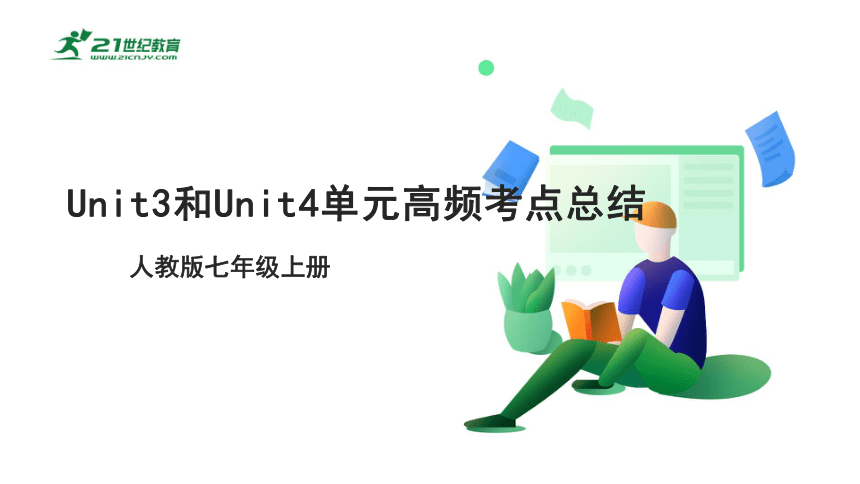 | |
| 格式 | zip | ||
| 文件大小 | 983.3KB | ||
| 资源类型 | 试卷 | ||
| 版本资源 | 人教新目标(Go for it)版 | ||
| 科目 | 英语 | ||
| 更新时间 | 2023-01-08 07:20:02 | ||
图片预览

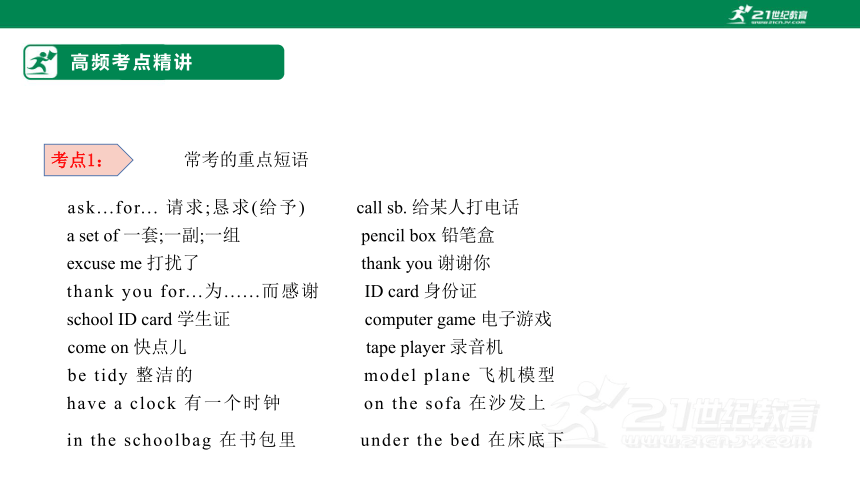
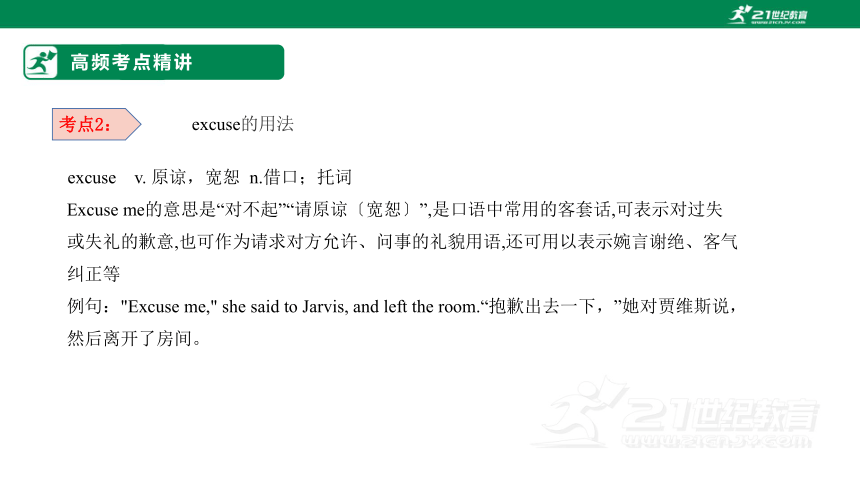
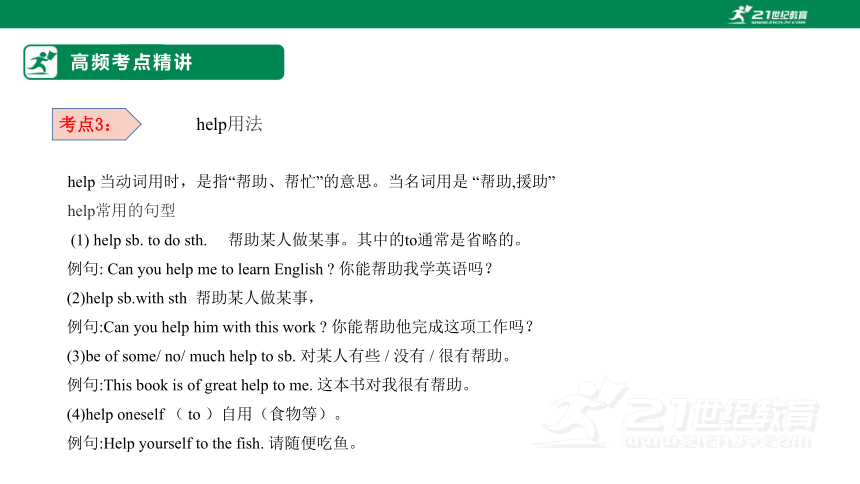
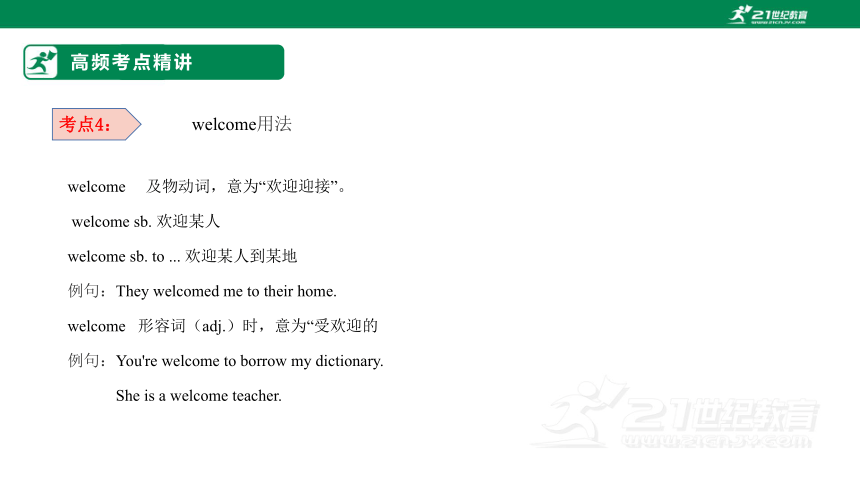
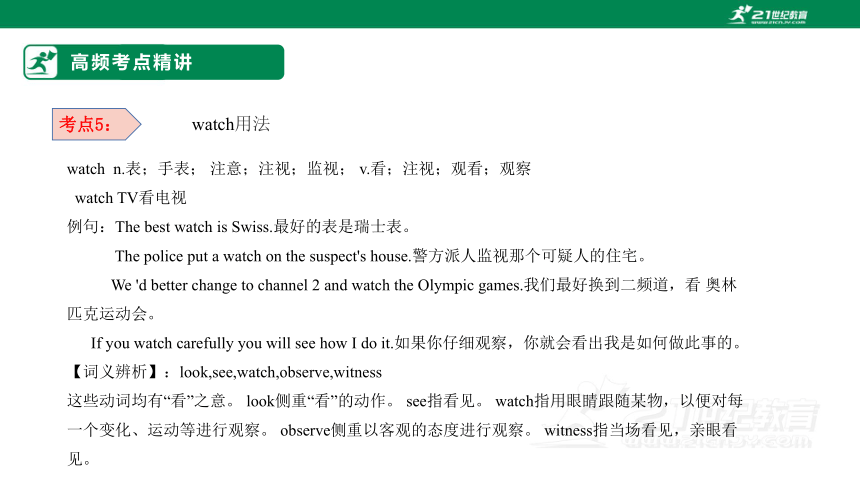
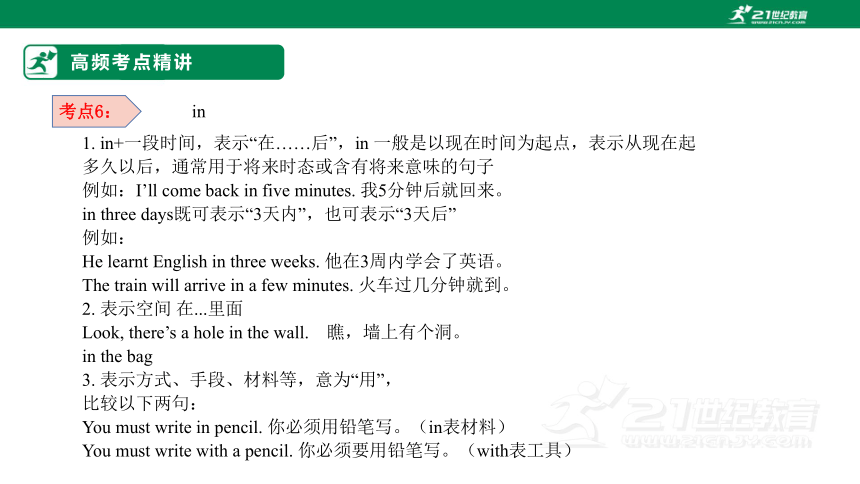
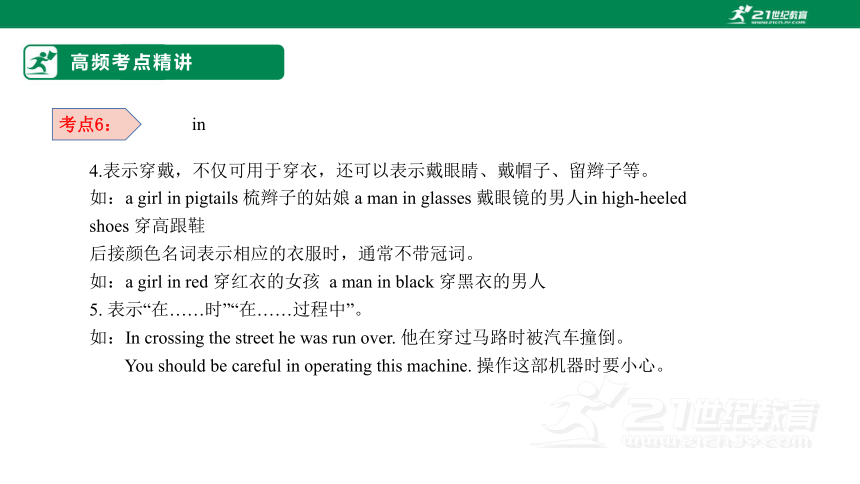
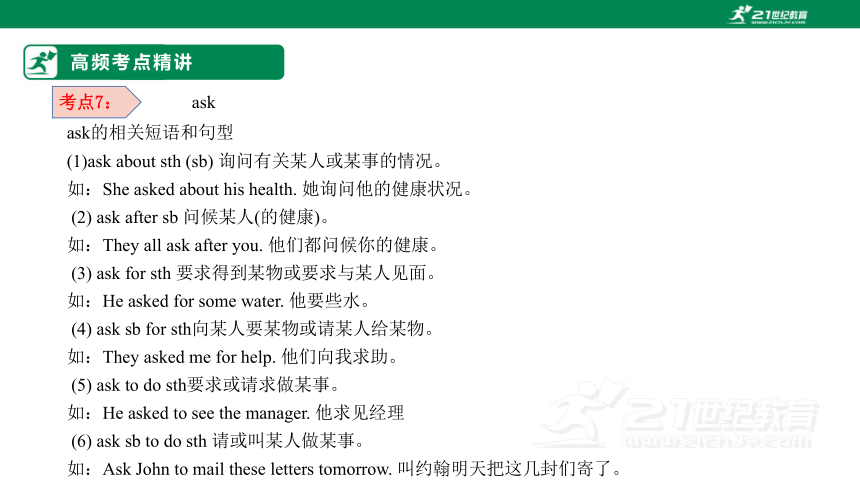
文档简介
(共24张PPT)
Unit3和Unit4单元高频考点总结
人教版七年级上册
高频考点精讲
考点1:
常考的重点短语
ask...for... 请求;恳求(给予) call sb. 给某人打电话
a set of 一套;一副;一组 pencil box 铅笔盒
excuse me 打扰了 thank you 谢谢你
thank you for...为......而感谢 ID card 身份证 school ID card 学生证 computer game 电子游戏
come on 快点儿 tape player 录音机
be tidy 整洁的 model plane 飞机模型
have a clock 有一个时钟 on the sofa 在沙发上
in the schoolbag 在书包里 under the bed 在床底下
高频考点精讲
考点2:
excuse的用法
excuse v. 原谅,宽恕 n.借口;托词
Excuse me的意思是“对不起”“请原谅〔宽恕〕”,是口语中常用的客套话,可表示对过失
或失礼的歉意,也可作为请求对方允许、问事的礼貌用语,还可用以表示婉言谢绝、客气
纠正等
例句:"Excuse me," she said to Jarvis, and left the room.“抱歉出去一下,”她对贾维斯说,
然后离开了房间。
高频考点精讲
考点3:
help用法
help 当动词用时,是指“帮助、帮忙”的意思。当名词用是 “帮助,援助”
help常用的句型
(1) help sb. to do sth. 帮助某人做某事。其中的to通常是省略的。
例句: Can you help me to learn English 你能帮助我学英语吗?
(2)help sb.with sth 帮助某人做某事,
例句:Can you help him with this work 你能帮助他完成这项工作吗?
(3)be of some/ no/ much help to sb. 对某人有些 / 没有 / 很有帮助。
例句:This book is of great help to me. 这本书对我很有帮助。
(4)help oneself ( to )自用(食物等)。
例句:Help yourself to the fish. 请随便吃鱼。
高频考点精讲
考点4:
welcome用法
welcome 及物动词,意为“欢迎迎接”。
welcome sb. 欢迎某人
welcome sb. to ... 欢迎某人到某地
例句:They welcomed me to their home.
welcome 形容词(adj.)时,意为“受欢迎的
例句:You're welcome to borrow my dictionary.
She is a welcome teacher.
高频考点精讲
考点5:
watch用法
watch n.表;手表; 注意;注视;监视; v.看;注视;观看;观察
watch TV看电视
例句:The best watch is Swiss.最好的表是瑞士表。
The police put a watch on the suspect's house.警方派人监视那个可疑人的住宅。
We 'd better change to channel 2 and watch the Olympic games.我们最好换到二频道,看 奥林匹克运动会。
If you watch carefully you will see how I do it.如果你仔细观察,你就会看出我是如何做此事的。
【词义辨析】:look,see,watch,observe,witness
这些动词均有“看”之意。 look侧重“看”的动作。 see指看见。 watch指用眼睛跟随某物,以便对每一个变化、运动等进行观察。 observe侧重以客观的态度进行观察。 witness指当场看见,亲眼看见。
高频考点精讲
考点6:
in
1. in+一段时间,表示“在……后”,in 一般是以现在时间为起点,表示从现在起多久以后,通常用于将来时态或含有将来意味的句子
例如:I’ll come back in five minutes. 我5分钟后就回来。
in three days既可表示“3天内”,也可表示“3天后”
例如:
He learnt English in three weeks. 他在3周内学会了英语。
The train will arrive in a few minutes. 火车过几分钟就到。
2. 表示空间 在...里面
Look, there’s a hole in the wall. 瞧,墙上有个洞。
in the bag
3. 表示方式、手段、材料等,意为“用”,
比较以下两句:
You must write in pencil. 你必须用铅笔写。(in表材料)
You must write with a pencil. 你必须要用铅笔写。(with表工具)
高频考点精讲
考点6:
in
4.表示穿戴,不仅可用于穿衣,还可以表示戴眼睛、戴帽子、留辫子等。
如:a girl in pigtails 梳辫子的姑娘 a man in glasses 戴眼镜的男人in high-heeled shoes 穿高跟鞋
后接颜色名词表示相应的衣服时,通常不带冠词。
如:a girl in red 穿红衣的女孩 a man in black 穿黑衣的男人
5. 表示“在……时”“在……过程中”。
如:In crossing the street he was run over. 他在穿过马路时被汽车撞倒。
You should be careful in operating this machine. 操作这部机器时要小心。
高频考点精讲
考点7:
ask
ask的相关短语和句型
(1)ask about sth (sb) 询问有关某人或某事的情况。
如:She asked about his health. 她询问他的健康状况。
(2) ask after sb 问候某人(的健康)。
如:They all ask after you. 他们都问候你的健康。
(3) ask for sth 要求得到某物或要求与某人见面。
如:He asked for some water. 他要些水。
(4) ask sb for sth向某人要某物或请某人给某物。
如:They asked me for help. 他们向我求助。
(5) ask to do sth要求或请求做某事。
如:He asked to see the manager. 他求见经理
(6) ask sb to do sth 请或叫某人做某事。
如:Ask John to mail these letters tomorrow. 叫约翰明天把这几封们寄了。
高频考点精讲
考点8:
some
some一般用于肯定句中,意思是“几个”、“一些”、“某个”作定语时可修饰可数名词或不可数名词。
如:I have some work to do today. 今天我有些事情要做。
(2)some 用于疑问句时,表示建议、请求或希望得到肯定回答。
如:Would you like some coffee with sugar 你要加糖的咖啡吗?
(3)pron.有些人;有的东西;若干(数量);若干部分,多少,几分,有些(of)
例句:There are people who swell with pride whenever they make some small contribution.有些人出了一点力就觉得了不起。
高频考点精讲
考点9:
must用法
must 情态动词 后接动词原形
You must phone him this evening. 今天晚上你必须给他打电话。
must否定句中,在情态动词must后面加 "not"即可;疑问句中, 情态动词则在主语之前。
You mustn’t phone him this evening. 今天晚上你可不能给他打电话。
Must I phone him this evening 我今天晚上必须给他打电话吗
回答must引起的一般疑问句,如果要作否定回答,一般是用 needn’t(不能用 mustn’t)。如:
A:Must I go there today 我必须今天去吗
B:Yes, you must. 是的,你必须今天去。
B:No, you needn’t. 不,你不必今天去。
高频考点精讲
考点10:
名词性物主代词
单数形式:mine(我的什么东西),yours(你的什么东西),his /hers /its(他的什么东西、她的什么东西、它的xx),Ben’s(本的什么东西)。
复数形式:ours(我们的什么东西),yours(你们的什么东西), theirs(他们的什么东西)。
名词性物主代词=形容词性物主代词+名词,可以像名词一样使用,起名词的作用
There is a book. It's hers. 这有本书。是她的(书)
My bag is yellow, her bag is red, his bag is blue and your bag is pink.=My bag is yellow, hers is red, his is blue and yours is pink.
高频考点精讲
考点11:
tidy的用法
tidy adj. 整洁的;整齐的;井然有序的;井井有条的
例:She keeps her flat very tidy .她把她的单元房间保持得很整洁。
I like everything to be neat and tidy .我喜欢一切都井井有条。
考点12:
everywhere的用法
everywhere adv. 处处;到处;各个地方;相当于here and there。
例:I’ve looked everywhere. 我各处都看过了。
【拓展】常见的地点副词somewhere 某地 (多用于肯定句中)
anywhere 什么地方;任何地方 (一般用于否定句和疑问句中)
nowhere 没有地方 (用于否定句中) here 这里there 那里
高频考点精讲
考点12:
表示空间位置的介词
in表示空间位置,意为“在 [ 容器,地点或地区 ] 里,在...内”
如:There's some suger in the cupboard.碗橱里有一些糖。
He lives in Beijing.他生活在北京。
on.表示“在....的上面或表面” ,如:
on the desk 在桌上 on the street = in the street 在街上
on the tree (水果长在)树上 in the tree (人或动物)在树上
on the wall(照片、字画)贴在,挂在墙上 in the wall (门、窗等)在墙上、
on表示方位(外部接壤),两地相连接,毗邻 ,如:
on the left/right 在左边/右边 on the north of... 在...北边
North Korea is on the north of South Korea. 朝鲜在韩国的北部。
under 在(或到,通过)…下面
例句:The chickens gathered under the hen.小鸡聚集在母鸡的肚子下面。
Some Negroes advanced in a bark under the balloon.在气球下面有几个黑人划着一只小船。
高频考点精讲
考点13:
Where引导的特殊疑问句
where引导的特殊疑问句作用是:询问人或者物品所在的位置。
回答时而应根据实际情况回答出物品所在的位置。
例如:
—Where are your books 你的书在哪里?
—They’re in my bag. 它们在我的包里。
高频考点精练
1. —Thank you for helping me with my physics.
—_____. I hope you can do better in it.
A. Good idea B. See you C. I'm not sure D. You're welcome
【答案】D
2. —Would you like _____ orange juice
—No, thanks. There is _____ in my bottle.
A. some, some B. any, any C. some, any D. any, some
【答案】A
3. —Who is that girl
—She is Mary, a friend of _____.
A. me B. mine C. my D. I
【答案】B
一、单项选择题
高频考点精练
4. Is this _____ ruler
—No. _____ is over there.
A. her; Her B. her; Hers C. hers; Hers D. hers; Her
【答案】B
5. I like to _____ TV, but my father likes to _____ books.
A. watch; read B. watch; look C. watch; see D. read; look at
【答案】A
6. David is an English boy, but he is _____ China now.
A. of B. in C. on D. at
【答案】B
高频考点精练
7. —_____ some meat
—OK. I'd like two kilos.
A. How's B. How about C. What's D. Is there
【答案】B
8. I think this book is interesting, _____ my classmates don't like it.
A. and B. so C. but D. /
【答案】C
9.Gina's things are _____ — on the bed, on the sofa and under the chair.
A. anywhere B. nowhere C. somewhere D. everywhere
【答案】D
高频考点精练
10. —_____ do the animals in Beijing Zoo come from
—They come from many different countries.
A. When B. How C. What D. Where
【答案】D
11. —_____ is my hat
— Sorry, I don't know.
A. Where B. Who C. Here D. What
【答案】A
12. David is an English boy, but he is _____ China now.
A. of B. in C. on D. at
【答案】B
高频考点精练
二、用所给单词的适当形式填空
1. He likes playing football, and he wants to be a football______ (play).
【答案】player
2. Where are _______(we) ping-pong bats
【答案】our
3. I plan to enter for a summer camp with a friend of ______. (me)
【答案】mine
4. I'm your ________ (teach) and you're my students.
【答案】teacher
5. This isn't Cindy's jacket.________ (she) is black.
【答案】Hers
高频考点精练
三、根据汉语或单词首字母提示填写单词
1. Does that beautiful girl want to be a ________(模特) when she grows up
【答案】model
2. His grandfather likes listening to the _________(收音机).
【答案】radio
3. I don't have a brother, b______ I have a sister.
【答案】but
4. That boy is _________(总是) late for school.
【答案】always
5. My grandfather doesn't play sports, but he w________ them on TV.
【答案】watches
高频考点精练
四、按要求完成句子。
1.The book is on the desk. (对划线部分提问)
_______ _______the book
【答案】Where, is
2. You can find signs here and there. (就划线部分提问)
______ _______you find signs
【答案】Where, can
3.Lisa is from France. (对画线部分进行提问)
________ ________Lisa from
【答案】Where, is
4.—Is your sister at school (作肯定回答)
—Yes, _______ _______ .
【答案】she, is
谢谢
21世纪教育网(www.21cnjy.com)
中小学教育资源网站
兼职招聘:
https://www.21cnjy.com/recruitment/home/admin
Unit3和Unit4单元高频考点总结
人教版七年级上册
高频考点精讲
考点1:
常考的重点短语
ask...for... 请求;恳求(给予) call sb. 给某人打电话
a set of 一套;一副;一组 pencil box 铅笔盒
excuse me 打扰了 thank you 谢谢你
thank you for...为......而感谢 ID card 身份证 school ID card 学生证 computer game 电子游戏
come on 快点儿 tape player 录音机
be tidy 整洁的 model plane 飞机模型
have a clock 有一个时钟 on the sofa 在沙发上
in the schoolbag 在书包里 under the bed 在床底下
高频考点精讲
考点2:
excuse的用法
excuse v. 原谅,宽恕 n.借口;托词
Excuse me的意思是“对不起”“请原谅〔宽恕〕”,是口语中常用的客套话,可表示对过失
或失礼的歉意,也可作为请求对方允许、问事的礼貌用语,还可用以表示婉言谢绝、客气
纠正等
例句:"Excuse me," she said to Jarvis, and left the room.“抱歉出去一下,”她对贾维斯说,
然后离开了房间。
高频考点精讲
考点3:
help用法
help 当动词用时,是指“帮助、帮忙”的意思。当名词用是 “帮助,援助”
help常用的句型
(1) help sb. to do sth. 帮助某人做某事。其中的to通常是省略的。
例句: Can you help me to learn English 你能帮助我学英语吗?
(2)help sb.with sth 帮助某人做某事,
例句:Can you help him with this work 你能帮助他完成这项工作吗?
(3)be of some/ no/ much help to sb. 对某人有些 / 没有 / 很有帮助。
例句:This book is of great help to me. 这本书对我很有帮助。
(4)help oneself ( to )自用(食物等)。
例句:Help yourself to the fish. 请随便吃鱼。
高频考点精讲
考点4:
welcome用法
welcome 及物动词,意为“欢迎迎接”。
welcome sb. 欢迎某人
welcome sb. to ... 欢迎某人到某地
例句:They welcomed me to their home.
welcome 形容词(adj.)时,意为“受欢迎的
例句:You're welcome to borrow my dictionary.
She is a welcome teacher.
高频考点精讲
考点5:
watch用法
watch n.表;手表; 注意;注视;监视; v.看;注视;观看;观察
watch TV看电视
例句:The best watch is Swiss.最好的表是瑞士表。
The police put a watch on the suspect's house.警方派人监视那个可疑人的住宅。
We 'd better change to channel 2 and watch the Olympic games.我们最好换到二频道,看 奥林匹克运动会。
If you watch carefully you will see how I do it.如果你仔细观察,你就会看出我是如何做此事的。
【词义辨析】:look,see,watch,observe,witness
这些动词均有“看”之意。 look侧重“看”的动作。 see指看见。 watch指用眼睛跟随某物,以便对每一个变化、运动等进行观察。 observe侧重以客观的态度进行观察。 witness指当场看见,亲眼看见。
高频考点精讲
考点6:
in
1. in+一段时间,表示“在……后”,in 一般是以现在时间为起点,表示从现在起多久以后,通常用于将来时态或含有将来意味的句子
例如:I’ll come back in five minutes. 我5分钟后就回来。
in three days既可表示“3天内”,也可表示“3天后”
例如:
He learnt English in three weeks. 他在3周内学会了英语。
The train will arrive in a few minutes. 火车过几分钟就到。
2. 表示空间 在...里面
Look, there’s a hole in the wall. 瞧,墙上有个洞。
in the bag
3. 表示方式、手段、材料等,意为“用”,
比较以下两句:
You must write in pencil. 你必须用铅笔写。(in表材料)
You must write with a pencil. 你必须要用铅笔写。(with表工具)
高频考点精讲
考点6:
in
4.表示穿戴,不仅可用于穿衣,还可以表示戴眼睛、戴帽子、留辫子等。
如:a girl in pigtails 梳辫子的姑娘 a man in glasses 戴眼镜的男人in high-heeled shoes 穿高跟鞋
后接颜色名词表示相应的衣服时,通常不带冠词。
如:a girl in red 穿红衣的女孩 a man in black 穿黑衣的男人
5. 表示“在……时”“在……过程中”。
如:In crossing the street he was run over. 他在穿过马路时被汽车撞倒。
You should be careful in operating this machine. 操作这部机器时要小心。
高频考点精讲
考点7:
ask
ask的相关短语和句型
(1)ask about sth (sb) 询问有关某人或某事的情况。
如:She asked about his health. 她询问他的健康状况。
(2) ask after sb 问候某人(的健康)。
如:They all ask after you. 他们都问候你的健康。
(3) ask for sth 要求得到某物或要求与某人见面。
如:He asked for some water. 他要些水。
(4) ask sb for sth向某人要某物或请某人给某物。
如:They asked me for help. 他们向我求助。
(5) ask to do sth要求或请求做某事。
如:He asked to see the manager. 他求见经理
(6) ask sb to do sth 请或叫某人做某事。
如:Ask John to mail these letters tomorrow. 叫约翰明天把这几封们寄了。
高频考点精讲
考点8:
some
some一般用于肯定句中,意思是“几个”、“一些”、“某个”作定语时可修饰可数名词或不可数名词。
如:I have some work to do today. 今天我有些事情要做。
(2)some 用于疑问句时,表示建议、请求或希望得到肯定回答。
如:Would you like some coffee with sugar 你要加糖的咖啡吗?
(3)pron.有些人;有的东西;若干(数量);若干部分,多少,几分,有些(of)
例句:There are people who swell with pride whenever they make some small contribution.有些人出了一点力就觉得了不起。
高频考点精讲
考点9:
must用法
must 情态动词 后接动词原形
You must phone him this evening. 今天晚上你必须给他打电话。
must否定句中,在情态动词must后面加 "not"即可;疑问句中, 情态动词则在主语之前。
You mustn’t phone him this evening. 今天晚上你可不能给他打电话。
Must I phone him this evening 我今天晚上必须给他打电话吗
回答must引起的一般疑问句,如果要作否定回答,一般是用 needn’t(不能用 mustn’t)。如:
A:Must I go there today 我必须今天去吗
B:Yes, you must. 是的,你必须今天去。
B:No, you needn’t. 不,你不必今天去。
高频考点精讲
考点10:
名词性物主代词
单数形式:mine(我的什么东西),yours(你的什么东西),his /hers /its(他的什么东西、她的什么东西、它的xx),Ben’s(本的什么东西)。
复数形式:ours(我们的什么东西),yours(你们的什么东西), theirs(他们的什么东西)。
名词性物主代词=形容词性物主代词+名词,可以像名词一样使用,起名词的作用
There is a book. It's hers. 这有本书。是她的(书)
My bag is yellow, her bag is red, his bag is blue and your bag is pink.=My bag is yellow, hers is red, his is blue and yours is pink.
高频考点精讲
考点11:
tidy的用法
tidy adj. 整洁的;整齐的;井然有序的;井井有条的
例:She keeps her flat very tidy .她把她的单元房间保持得很整洁。
I like everything to be neat and tidy .我喜欢一切都井井有条。
考点12:
everywhere的用法
everywhere adv. 处处;到处;各个地方;相当于here and there。
例:I’ve looked everywhere. 我各处都看过了。
【拓展】常见的地点副词somewhere 某地 (多用于肯定句中)
anywhere 什么地方;任何地方 (一般用于否定句和疑问句中)
nowhere 没有地方 (用于否定句中) here 这里there 那里
高频考点精讲
考点12:
表示空间位置的介词
in表示空间位置,意为“在 [ 容器,地点或地区 ] 里,在...内”
如:There's some suger in the cupboard.碗橱里有一些糖。
He lives in Beijing.他生活在北京。
on.表示“在....的上面或表面” ,如:
on the desk 在桌上 on the street = in the street 在街上
on the tree (水果长在)树上 in the tree (人或动物)在树上
on the wall(照片、字画)贴在,挂在墙上 in the wall (门、窗等)在墙上、
on表示方位(外部接壤),两地相连接,毗邻 ,如:
on the left/right 在左边/右边 on the north of... 在...北边
North Korea is on the north of South Korea. 朝鲜在韩国的北部。
under 在(或到,通过)…下面
例句:The chickens gathered under the hen.小鸡聚集在母鸡的肚子下面。
Some Negroes advanced in a bark under the balloon.在气球下面有几个黑人划着一只小船。
高频考点精讲
考点13:
Where引导的特殊疑问句
where引导的特殊疑问句作用是:询问人或者物品所在的位置。
回答时而应根据实际情况回答出物品所在的位置。
例如:
—Where are your books 你的书在哪里?
—They’re in my bag. 它们在我的包里。
高频考点精练
1. —Thank you for helping me with my physics.
—_____. I hope you can do better in it.
A. Good idea B. See you C. I'm not sure D. You're welcome
【答案】D
2. —Would you like _____ orange juice
—No, thanks. There is _____ in my bottle.
A. some, some B. any, any C. some, any D. any, some
【答案】A
3. —Who is that girl
—She is Mary, a friend of _____.
A. me B. mine C. my D. I
【答案】B
一、单项选择题
高频考点精练
4. Is this _____ ruler
—No. _____ is over there.
A. her; Her B. her; Hers C. hers; Hers D. hers; Her
【答案】B
5. I like to _____ TV, but my father likes to _____ books.
A. watch; read B. watch; look C. watch; see D. read; look at
【答案】A
6. David is an English boy, but he is _____ China now.
A. of B. in C. on D. at
【答案】B
高频考点精练
7. —_____ some meat
—OK. I'd like two kilos.
A. How's B. How about C. What's D. Is there
【答案】B
8. I think this book is interesting, _____ my classmates don't like it.
A. and B. so C. but D. /
【答案】C
9.Gina's things are _____ — on the bed, on the sofa and under the chair.
A. anywhere B. nowhere C. somewhere D. everywhere
【答案】D
高频考点精练
10. —_____ do the animals in Beijing Zoo come from
—They come from many different countries.
A. When B. How C. What D. Where
【答案】D
11. —_____ is my hat
— Sorry, I don't know.
A. Where B. Who C. Here D. What
【答案】A
12. David is an English boy, but he is _____ China now.
A. of B. in C. on D. at
【答案】B
高频考点精练
二、用所给单词的适当形式填空
1. He likes playing football, and he wants to be a football______ (play).
【答案】player
2. Where are _______(we) ping-pong bats
【答案】our
3. I plan to enter for a summer camp with a friend of ______. (me)
【答案】mine
4. I'm your ________ (teach) and you're my students.
【答案】teacher
5. This isn't Cindy's jacket.________ (she) is black.
【答案】Hers
高频考点精练
三、根据汉语或单词首字母提示填写单词
1. Does that beautiful girl want to be a ________(模特) when she grows up
【答案】model
2. His grandfather likes listening to the _________(收音机).
【答案】radio
3. I don't have a brother, b______ I have a sister.
【答案】but
4. That boy is _________(总是) late for school.
【答案】always
5. My grandfather doesn't play sports, but he w________ them on TV.
【答案】watches
高频考点精练
四、按要求完成句子。
1.The book is on the desk. (对划线部分提问)
_______ _______the book
【答案】Where, is
2. You can find signs here and there. (就划线部分提问)
______ _______you find signs
【答案】Where, can
3.Lisa is from France. (对画线部分进行提问)
________ ________Lisa from
【答案】Where, is
4.—Is your sister at school (作肯定回答)
—Yes, _______ _______ .
【答案】she, is
谢谢
21世纪教育网(www.21cnjy.com)
中小学教育资源网站
兼职招聘:
https://www.21cnjy.com/recruitment/home/admin
同课章节目录
- starters 预备篇(2012秋审查)
- Unit 1 Good morning !
- Unit 2 What’s this in English?
- Unit 3 What color is it ?
- Unit 1 My name's Gina.
- Section A
- Section B
- Unit 2 This is my sister.
- Section A
- Section B
- Unit 3 Is this your pencil?
- Section A
- Section B
- Unit 4 Where's my schoolbag?
- Section A
- Section B
- Unit 5 Do you have a soccer ball?
- Section A
- Section B
- Unit 6 Do you like bananas?
- Section A
- Section B
- Unit 7 How much are these socks?
- Section A
- Section B
- Unit 8 When is your birthday?
- Section A
- Section B
- Unit 9 My favorite subject is science.
- Section A
- Section B
